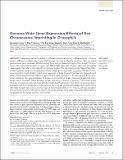| dc.contributor.author | Lemos, Bernardo | en_US |
| dc.contributor.author | Branco, Alan T. | en_US |
| dc.contributor.author | Jiang, Pan-Pan | en_US |
| dc.contributor.author | Hartl, Daniel L. | en_US |
| dc.contributor.author | Meiklejohn, Colin D. | en_US |
| dc.date.accessioned | 2014-03-11T13:25:06Z | |
| dc.date.issued | 2014 | en_US |
| dc.identifier.citation | Lemos, Bernardo, Alan T. Branco, Pan-Pan Jiang, Daniel L. Hartl, and Colin D. Meiklejohn. 2014. “Genome-Wide Gene Expression Effects of Sex Chromosome Imprinting in Drosophila.” G3: Genes|Genomes|Genetics 4 (1): 1-10. doi:10.1534/g3.113.008029. http://dx.doi.org/10.1534/g3.113.008029. | en |
| dc.identifier.issn | 2160-1836 | en |
| dc.identifier.uri | http://nrs.harvard.edu/urn-3:HUL.InstRepos:11879473 | |
| dc.description.abstract | Imprinting is well-documented in both plant and animal species. In Drosophila, the Y chromosome is differently modified when transmitted through the male and female germlines. Here, we report genome-wide gene expression effects resulting from reversed parent-of-origin of the X and Y chromosomes. We found that hundreds of genes are differentially expressed between adult male Drosophila melanogaster that differ in the maternal and paternal origin of the sex chromosomes. Many of the differentially regulated genes are expressed specifically in testis and midgut cells, suggesting that sex chromosome imprinting might globally impact gene expression in these tissues. In contrast, we observed much fewer Y-linked parent-of-origin effects on genome-wide gene expression in females carrying a Y chromosome, indicating that gene expression in females is less sensitive to sex chromosome parent-of-origin. Genes whose expression differs between females inheriting a maternal or paternal Y chromosome also show sex chromosome parent-of-origin effects in males, but the direction of the effects on gene expression (overexpression or underexpression) differ between the sexes. We suggest that passage of sex chromosome chromatin through male meiosis may be required for wild-type function in F1 progeny, whereas disruption of Y-chromosome function through passage in the female germline likely arises because the chromosome is not adapted to the female germline environment. | en |
| dc.language.iso | en_US | en |
| dc.publisher | Genetics Society of America | en |
| dc.relation.isversionof | doi:10.1534/g3.113.008029 | en |
| dc.relation.hasversion | http://www.ncbi.nlm.nih.gov/pmc/articles/PMC3887524/pdf/ | en |
| dash.license | LAA | en_US |
| dc.subject | sex chromosome | en |
| dc.subject | imprinting | en |
| dc.subject | | en |
| dc.subject | microarray | en |
| dc.title | Genome-Wide Gene Expression Effects of Sex Chromosome Imprinting in Drosophila | en |
| dc.type | Journal Article | en_US |
| dc.description.version | Version of Record | en |
| dc.relation.journal | G3: Genes|Genomes|Genetics | en |
| dash.depositing.author | Branco, Alan T. | en_US |
| dc.date.available | 2014-03-11T13:25:06Z | |
| dc.identifier.doi | 10.1534/g3.113.008029 | * |
| dash.contributor.affiliated | Jiang, Pan-Pan | |
| dash.contributor.affiliated | Hartl, Daniel | |
| dash.contributor.affiliated | Branco, Alan | |


